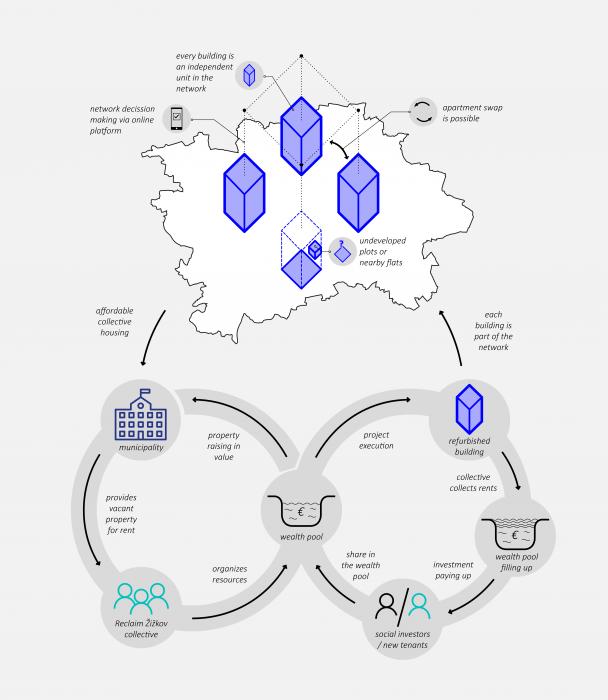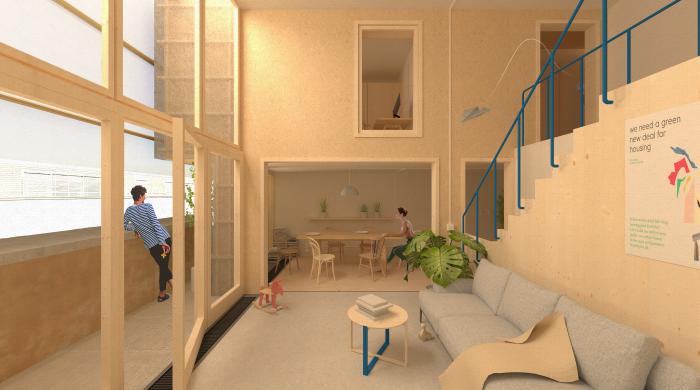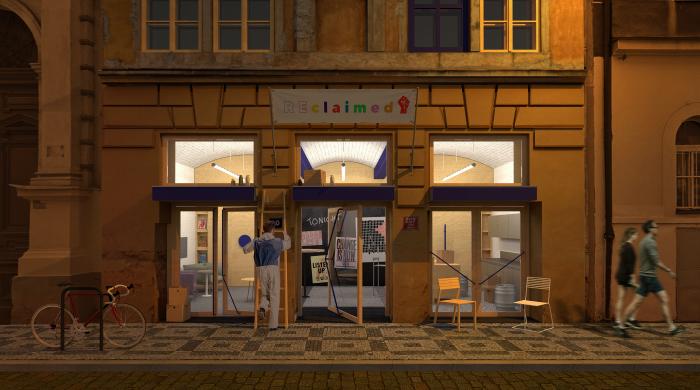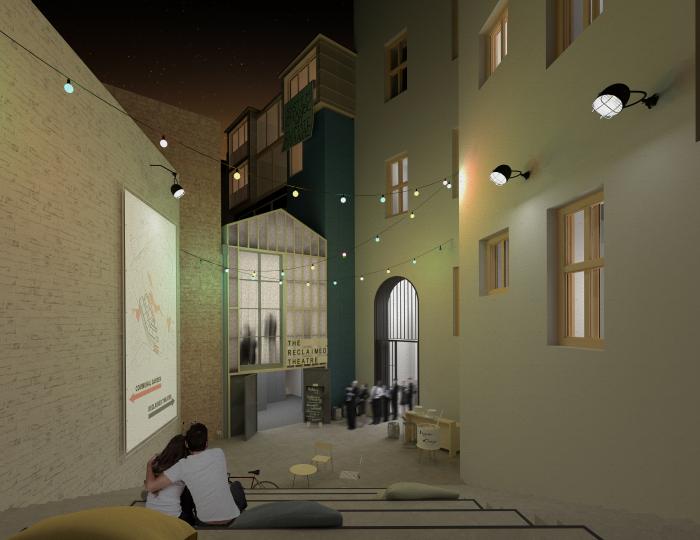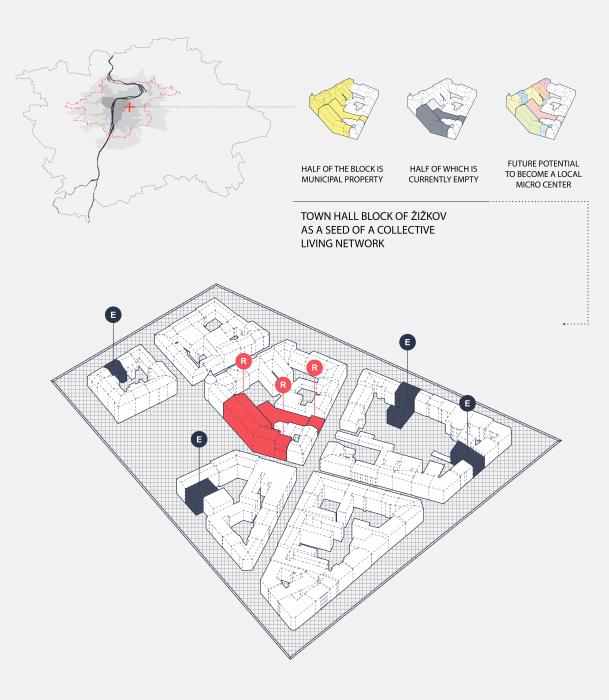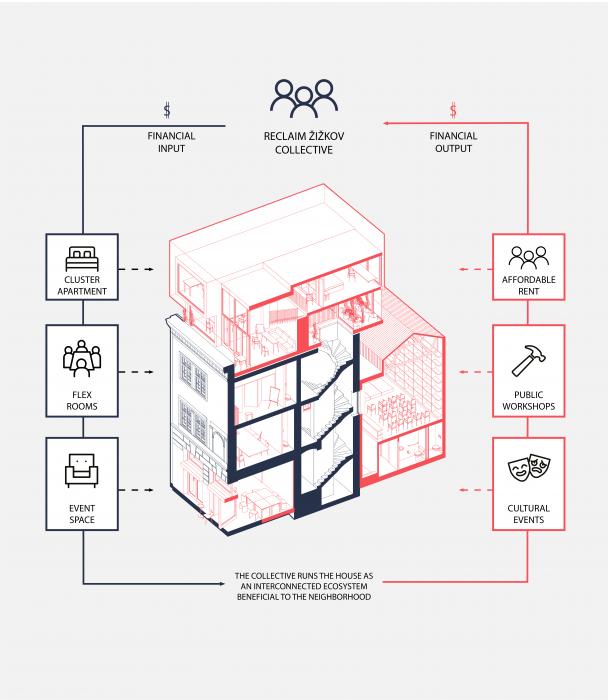Once a working-class neighbourhood known for its vibrant social scene and progressive community, Žizkov has been subject to market pressure, with private development pushing locals out. Reclaim Žižkov aims to resuscitate the neighbourhood by creating desirable, affordable and sustainable housing. In partnership with the district town hall, Reclaim Žizkov intends to convert vacant municipal property into a living network that includes shared spaces and is based on cooperative management, offering a new paradigm for cities losing their spirit.
The political hot potato of gentrification afflicts Prague like many major cities, yet the district of Žižkov is uniquely placed to combat the ensuing displacement of people and culture. Formerly a working-class neighborhood known for its vibrant social scene and progressive community, Žizkov’s dilapidated buildings and small businesses began to succumb to market pressures that saw private development push locals out. But this community’s activists and, sometimes, subversive cultural milieu inspired some recourse. Reclaim Žižkov is a designed act of defiance to take back ownership of people’s urban future through a more cooperative approach to affordable housing.
In partnership with the Žizkov district town hall, Reclaim Žižkov aims to seed a collective housing network from vacant municipal buildings. The proposal transforms the half vacant town hall block of Žižkov into a new micro-center with a mix of affordable housing, retail, entertainment, and educational programme. High-quality green and flexible spaces are connected through reconfigured entrances and walkways that fuse the new centrality into its surroundings.
Central to the Reclaim Žižkov design is the three pillars of sustainability – environmental, economic, and social. Environmentally, the project focuses on circularity and reducing consumption. This project embraces the renovation revolution as a key aspect of the EU Green Deal strategy. Economic sustainability is addressed through proposed multi-source financing. The typical investor-developer model is replaced with a not-for-profit model known as a “wealth pool”. And socially, an emphasis on participation and democratic processes strives to give inhabitants a greater voice within their city through their concerted efforts.
This project is a demonstrator for actionable change. Through its framework, Reclaim Žižkov shows how the architecture of collective living can play a part in creating a desirable, affordable, and robust city.
Please highlight how the concept/idea can be exemplary in this context
Reclaim Žižkov aims to support a sustainable urban environment by building a community based on collective living, a shared lifestyle that reduces the individual’s consumption of space and resources. Specifically, the project focuses on environmental sustainability through two main objectives – reducing the spatial and material requirements an individual needs and renovating unused municipal buildings.
Greater emphasis on sharing is a major aspect of collective living. We can provide high living standards and lower economic burdens while reducing the environmental footprint of an individual by combining common amenities. This covers everyday activities such as washing or caring for children, as well as occasional situations such as guest accommodation, home office work, or gardening. In one city block, two busy guest rooms are enough, instead of twenty occasionally used. Twenty shared washing machines will serve instead of two hundred private ones. And two hundred square meters of community gardens produce more vegetables than two thousand lonely plants.
Working with the municipality, Reclaim Žižkov also aims to reuse vacant municipal buildings. These buildings are very often suitable for housing but remain empty due to the lack of active interest in their renewal. The ‘renovation wave’ is a key strategy to meet the EU’s climate targets. By refurbishing existing unoccupied buildings in Žižkov, the embodied energy needed to produce essential housing in Prague is greatly reduced.
Through the collective living network, Reclaim Žižkov is able to redistribute resources to where they’re needed. Collectives can efficiently use existing material and refurbish or even extend their buildings using consolidated material from the network. Circulation of residents within the network to living spaces more suited to their needs, such as downsizing or upsizing, also addresses consumption footprints. (See Annex 01)
Please highlight how the concept/idea can be exemplary in this context
The aesthetic goal of Reclaim Žižkov is to embody the commonness and informality of authentic Prague districts and visually encourage residents to make their own creative interventions. The design of the Žižkov micro-centre gains from the predisposition for original architectural solutions in reconstruction and combines it with other aspects of the project, such as affordability or creative improvisation.
During the reconstruction of the existing buildings, the original qualities are preserved and small details with a human touch are highlighted. One such example is the preservation of the remaining 16th-century façade, yet elevating the later interventions into design elements. The irregular openings after garage entrances are thus fitted with custom-made doors, where each door opens differently, creating distinctive ways for the house to communicate with the street. (see Annex 02)
In new extensions, affordability and openness to user intervention are aestheticized. The use of affordable and easily adaptable materials in their raw state creates informal living spaces and encourages residents to feel at home and take action. This architectural principle opposes cheap imitations in contemporary development, and on the contrary, strictly designed uninviting architecture. (see Annex 03)
Please highlight how the concept/idea can be exemplary in this context
An important goal of Reclaim Žižkov is to initiate complex cooperation between the municipality and its citizens. As a facilitator, the project aims to provide equal opportunities for affordable and more secure housing, to give residents the opportunity to design and have power over their livelihoods, and to engage in self-driven projects that benefit the city.
Individual houses are managed by cooperatives. These are groups of people intentionally organised to implement the project and run the house. The cooperative rents the building from the city on a long-term contract, while the members of the cooperative may change over time. Thus, members do not bear financial risks individually, and at the same time, they maintain autonomy over the living situation. Within the cooperative, members are both developers and residents of the house and democratically decide on how to use it. Additional public programme can be initiated by the collective such as public spaces, civic amenities like kindergartens, cultural spaces, or commercial ventures like cafes. This contributes to the neighborhood but is always coordinated by the collective. The freedom to choose how they shape their physical community, in turn, stimulates more engagement. In this way, the building gives something back to the city. (see Annex 04)
The Žižkov micro-center is the seed of Reclaim Žižkov's long-term vision to assemble a larger number of renovated buildings into a collective living network. This network benefits from an increasingly larger wealth pool which can be used to invest back into the network, in turn offering more affordable housing. The collectives can be organised in several different ways. Not all inhabitants will want to have the same level of participation and that is part of the ethos of Reclaim Žižkov. Councils can be elected or more tech savvy methods of direct democracy through an online platform can be implemented.
Please highlight how this approach can be exemplary
Reclaim Žižkov combines the three aspects in the proposal of transforming the Žižkov town hall block into a local micro-center – a mix of affordable housing, retail, entertainment and educational programs, quality green and flexible spaces. The design works with three empty buildings and an adjacent garden. Each semi-autonomous unit (building or outdoor space) is managed by a separate group of people approaching affordable housing according to their will, similarly managed are the public spaces. (see Annex 05)
If, for instance, a resident of Žižkov wants to join the network, they will either apply to an existing collective or establish a new one. After paying the entrance deposit and with municipal subsidies, the collective raises money for the reconstruction of the house independent of a developer. The members might decide to combine cluster apartments (a living situation where a non-related group of people shares and a larger apartment with private and common spaces) and supplement them with flexible rooms and a public ground floor. A proposal comes out of an architectural competition and is implemented from the common budget. Collective jointly decides whether to rent flexible rooms for yoga classes or use them for home office. (see Annex 04) As proposed, the Reclaimed Theater on the ground floor serves as a public living room during the day, and a small event space in the evening once accessed from the street and once from the adjacent semi-public garden. (see Annex 06) Here, another collective runs a community garden. All these smaller activities can be used to earn money for the collective to run their building.
In the event of a life change, such as the birth of a child, members can look for an available family apartment within the Network via the online platform. When leaving one collective, the original deposit is returned to them and they can transfer it to another collective in the neighboring building. So there is no need to leave your community
In the context of the Prague housing crisis, Reclaim Žižkov challenges mainstream housing practices and their ability to promote a sense of belonging and community-making. The project deals with the way housing is developed, with progressive housing and mix-use typologies, as well as with ownership structures and their impact on the prosperity of the individual, the community, and the city.
Reclaim Žižkov helps form a new collective to be the resident-developer. Due to its non-profit nature, this collective can approach the Prague municipality to establish a partnership and rent a vacant building with subsidies. As a city asset, it can be turned into affordable housing without incurring construction or operational costs and in turn, the collective must only raise enough money for refurbishment instead of an entirely new building.
Reclaim Žižkov finances the project through an alternative financing model known as Vermögenspool or wealth pool. This involves the collective's members investing an initial deposit and a portion of their rental payments into the wealth pool. Other non-residents such as commercial occupants also contribute to the pool, as well as social investors who may deposit money as an appreciating investment. The collective ensures a balanced inflow and outflow, and keeps a liquid cash reserve, so the previous investors can withdraw their portion and members can rotate.
This special partnership allows the city’s property to retain its land value whilst
providing affordable housing without a large investment. It also reduces the usual economic burden of housing acquisition, so more people can afford it, while introducing collective ownership, giving people more power over their living situation within a stable community. On top of that, the municipality can outline rules to encourage the collectives to offer civic amenities and cultural spaces to the neighborhood, but give enough freedom for the members to experiment with housing typologies.
Reclaim Žižkov is developed as an academic project in conversation with the municipality, the local experts on housing, and the locally active civic groups.
Given the fragmentation of the local scene, the first step is to promote links between its various parties. This will include reaching out to different parties and finding future partners to gain a more coherent awareness of local housing issues among these parties, as well as better knowledge of the barriers to affordable housing and the potentials to promote a sense of belonging.
Next will be to overlap local and international experience. Prague still lacks a conceptual approach to its housing issues and a good knowledge of current trends in development methods and housing typologies. Therefore, many specific tools for putting these trends into practice are missing. Reclaim Žižkov plans to learn from pioneers abroad together with specific Prague civic collectives, as well as cultural or academic entities. Its output should be a detailed acquisition of new trends relevant to the Prague context.
However, further research and networking are only an ongoing by-product on the way to implementing affordable collective housing projects. Reclaim Žižkov aims to serve as an initiative creating opportunities by finding relevant objects, motivating the political sphere, providing expertise to future collectives, and communicating with the general public. The first planned initiative is to address the Žižkov municipality. However, a large-scale micro-center project must be implemented in stages, such as holding cultural events in the vacant garden to meet locals and introduce the concept to future potential members. The actual intervention will require a public tender for the lease of one of the buildings and subsequently an architectural competition under the leadership of the winning collective as earlier described above. The key success of Reclaim Žižkov would be the implementation of the flagship project.
After developing condensed promotion material, Reclaim Žižkov will reach back to the Committee on Territorial Development of the Žižkov municipality; to the Member of the City Council of Prague for housing and transparency; to academic institutions, such as the Faculty of Architecture at the CTU Prague; or to the local pioneers, such as the collective Shared Houses realizing the first collective housing projects in Prague. These previously contacted parties are key to initial networking.
Simultaneously, Reclaim Žižkov will assemble a working group to address specific civic collectives in Prague and specifically Žižkov, as well as cultural or academic entities, or political institutions. In newly established partnerships, Reclaim Žižkov will work on projects, such as outlining multiple options of gaining affordable housing, proposing multiple housing typologies, or developing specific (legal) tools that are currently missing. Networking with the discourse leading cities such as Berlin, Vienna, Zürich, or Copenhagen will be an essential activity.
Continuously, Reclaim Žižkov will look for opportunities to promote inclusive, participatory, and affordable housing in public media. One such collaboration in the making is a conversation with the collective City Memory, producing a podcast series about gentrified districts in Prague. Another considered participation is with the magazine ERA21, to which the author occasionally contributes. Starting a public discussion on a very neglected topic of housing and a sense of belonging will be crucial for the future implementation of Reclaim Žižkov.
@Mraz, 2022
Content licensed to the European Union.
